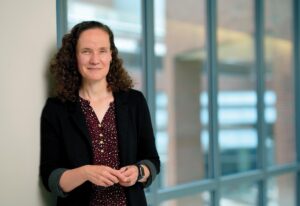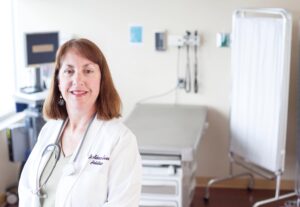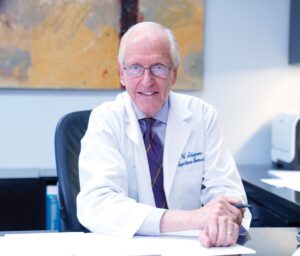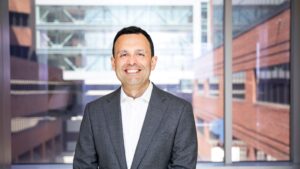What the Pandemic is Teaching Us

It’s too soon to call an end to COVID-19, the worst worldwide pandemic in 100 years, which has killed as many Americans as the 1918-19 flu. The slow uptake of effective vaccines has enabled the causative virus, SARS-CoV-2, to continue to evolve in dangerous and easily transmissible ways.
But it’s not too early for health care providers, their trainees and those engaged in biomedical research to take stock. What did they do well? Where did they fail? That kind of reflection, that tallying of lessons learned — or ignored — will help us finally put an end to the present pandemic and prepare for the next one. Key decision makers and stakeholders at Vanderbilt University Medical Center (VUMC) weigh in on takeaways that are likely to have a lasting impact on patient care, education and research.
Offer holistic, compassionate care
From the get-go VUMC had to manage its workforce adroitly, given that a preexisting national nursing shortage was suddenly exacerbated by those who had to quarantine after testing positive for SARS-CoV-2. A labor pool was set up, and employees were cross-trained to adequately staff clinical areas of greatest need.
The challenges were immense. To prevent the spread of infection, family members could not visit the bedsides of critically ill loved ones, while exhausted staff faced burnout. As admissions increased, faculty and resident physicians from nearly every specialty filled unfamiliar roles as did registered nurses, nurse practitioners, physician assistants, respiratory therapists and other front-line workers.
Months into the pandemic, more than 50 physicians from across the Medical Center had volunteered to communicate with family members of patients in the COVID-19 ICU so their fellow physicians and nurses could focus on direct patient care.
“Patient care at the bedside is priority,” said Kyla Terhune, MD, MBA, associate dean for Graduate Medical Education. “However, for a family member waiting at home for any news regarding their loved one, having someone who is totally dedicated to communicating to them is just as critical. It’s holistic, compassionate care.”

Early in the pandemic and until personal protective equipment became more widely available, medical doctors who specialize in providing care in the hospital, called hospitalists, treated all COVID-19 patients admitted to VUMC except those in the intensive care unit.
Physicians and advanced practice providers from the Section of Hospital Medicine also trained others in COVID-19 care, supervised the post-discharge monitoring program, COVID-2-Home, and helped identify and enroll patients in clinical trials, said section chief Eduard Vasilevskis, MD, MPH, associate professor of Medicine.
Elsewhere, nonclinical staff members learned to register and transport patients, work in the lab, unpack and distribute supplies, and perform other nonclinical duties.
Executive leaders of the Medical Center “pitched in and were seen cleaning rooms, transporting patients and delivering trays,” said Mark Sullivan, PharmD, MBA, executive director of VUMC Inpatient and Clinical Pharmacy Operations. “The visibility of our leadership … kept us all calm and focused on the job at hand.”
“It was an amazing experience,” added April Kapu, DNP, APRN, who was associate nursing officer for advanced practice at the time, “seeing the Vanderbilt Valet team helping to temperature-screen visitors, pediatric nurses working in the adult acute care units, nurse practitioners and resident physicians taking hotline calls, and so many others who were quick to jump in and help … in new and unfamiliar ways.”
Similar adjustments were made in the residency training programs. At any one time more than 1,000 resident physicians — medical school graduates — are receiving specialty training at VUMC in internal medicine, pediatrics, obstetrics and gynecology (OB-GYN), surgery, anesthesiology and other disciplines.
Very early on in the pandemic, Terhune, in concert with the residency program directors, created an inventory listing the expertise and critical care experience of each trainee.
“That allowed us very quickly to staff up or staff down inpatient services,” said John McPherson, MD, the Drs. Sol and Marvin Rosenblum Professor of Medicine and director of the Internal Medicine Residency Program.
As most patients who were severely ill with COVID-19 were treated on the medical units, at first the burden of caring for them fell primarily on the internal medicine residents. Six months into the pandemic other residents came in to relieve them, “without any prompting from us,” McPherson said.
“Teams from Surgery, from Anesthesiology, from OB-GYN, from all of the other programs came in and staffed these units to allow our residents to take a break and to minimize the disruption to their training,” he said.
Adapt technology
Information technology was a key part of VUMC’s COVID-19 response. At the beginning of the pandemic, most meetings and clinics moved online to curtail the spread of the virus. How to continue to provide “hands-on” learning to resident physicians was a particular challenge. In the Emergency Medicine program, for example, “you can’t really have a virtual chest tube clinic,” said Matthew Pirotte, MD, associate professor of Emergency Medicine. “At some point you have to put your gloves on.”
On the other hand, “video conferencing is a pretty decent format for a didactic lecture. We are definitely toying with the idea of having some virtual conference modules going forward,” he said.
“Our students and residents may feel (perhaps appropriately) that they may not have gotten the ‘normal’ experience,” added Sullivan, who directs the residency program in Health System Pharmacy Administration. “But they got an experience that trainees haven’t seen in our country since the 1918 flu outbreak.
“They will be more resilient,” he said, “more aware of the gift of health and the value of evidence-based science, perhaps, than their colleagues who came before them.”

The recruitment of medical school graduates into residency training programs transformed. Switching to online interviews “leveled the playing field,” said Rebecca Swan, MD, professor of Pediatrics and director of the Pediatric Residency Training Program at the time. “We were able to talk to some really talented students who may not have been able to fly from the other side of the country.
“Did that really change who we recruited? Come back to talk to me in three or four months, and I’ll tell you,” Swan said. In the meantime, prospective pediatric residents will continue to be interviewed online.
One of the most profound impacts of the pandemic was the acceleration of telehealth — the movement of the traditional in-person office or clinic visit online.
With the urgent need to protect patients from being exposed to the virus, by the height of Nashville’s pandemic — in late 2020 and early 2021 — many VUMC clinic visits were being conducted virtually.
Patients were also encouraged to enroll in My Health at Vanderbilt, VUMC’s telehealth portal, where they could schedule their doctors’ appointments, refill prescriptions, view test results and obtain a wide range of health-related information.
For some service lines, such as behavioral health, where 65% of clinic visits are still held online, telehealth has become the new norm. “It is very convenient for the patients,” said Health IT Chief Information Officer Neal Patel, MD, MPH, professor of Clinical Pediatrics.
Telehealth probably would have happened anyway, but the pandemic “forced us to move quickly to adopt ways of doing things differently,” he said. “We have become a digital world.”
The pandemic also accelerated advances in post-discharge care and other areas, Vasilevskis added. “It was wonderful to see how fast mountains could be moved,” he said, “… when hospitals, local governments and the health care system (worked) together.”
Rely on research
Much of that “transformational energy” came from the research community, observed William Schaffner, MD, professor of Preventive Medicine in the Department of Health Policy and professor of Medicine in the Division of Infectious Diseases, and among VUMC’s most frequently quoted COVID-19 experts.

At the national level, Kathryn Edwards, MD, Marie Griffin, MD, MPH, and H. Keipp Talbot, MD, MPH, served on panels that provided scientific oversight of vaccine trials and developed recommendations for vaccination policies.
Mark Denison, MD, director of the Division of Pediatric Infectious Diseases, and his group applied a wealth of information about coronaviruses they had amassed over the years to evaluate and ultimately demonstrate the effectiveness of remdesivir, the first antiviral drug authorized for emergency use in patients hospitalized with COVID-19.
James Crowe Jr., MD, director of the Vanderbilt Vaccine Center, and his colleagues pioneered the development of monoclonal antibodies, which by neutralizing the virus with laser-like precision can prevent infected patients from becoming seriously ill.
Buddy Creech, MD, MPH, director of the Vanderbilt Vaccine Research Program, led clinical trials that contributed to the rapid development of the first COVID-19 vaccines authorized for emergency use in the United States.
The Vanderbilt Institute for Clinical and Translational Research helped lead a national effort to “repurpose” drugs used for other health conditions to relieve symptoms and improve outcomes from COVID-19.
One of those drugs, hydroxychloroquine, used to treat certain rheumatologic conditions and malaria, was found not to be of significant benefit to hospitalized COVID-19 patients, despite preliminary evidence to the contrary.
“This was a test of how efficient our clinical research infrastructure could be in an emergency,” said Wesley Self, MD, MPH, who led a national trial of hydroxychloroquine funded by the National Heart, Lung, and Blood Institute of the National Institutes of Health.
“A large, high-quality, clinical trial to evaluate a drug like this would often take a year or more to design and launch,” said Self, associate professor of Emergency Medicine and vice president for Clinical Research Networks and Strategy at VUMC. “The COVID-19 pandemic did not allow for this type of time.”
So the clinical trials team at VUMC swung into action. On April 1, 2020, just 13 days after the idea for the trial was conceived, the first patient was enrolled at VUMC. Within 78 days, the study had enrolled 479 patients from 34 hospitals across the country.
There is no reason for a pandemic to push providers to adopt practices prematurely before they have been adequately tested. “The clinical research infrastructure can be incredibly efficient when faced with an emergency,” Self said.
And yet COVID-19 also has put a strain on “peer review,” the long-established system by which qualified “peer” researchers review their colleagues’ studies before they are published in a scientific journal.
The problem is, there simply are not enough peers who are willing to give up some of their time in the laboratory or clinic to review the findings of others. The avalanche of studies propelled by the pandemic has only exacerbated this shortage.
Peer review has its function and “right now that function is really being challenged and overwhelmed,” said Robert Carnahan, PhD, associate professor of Pediatrics and associate director of the Vanderbilt Vaccine Center where much of the monoclonal antibody work is conducted.
While the pandemic has exposed weaknesses in the scientific review process, overall the nation’s research enterprise, and VUMC in particular, “contributed mightily” on three levels, Schaffner said.
- Basic research to understand the virus, develop diagnostic tests, study antibody responses and create vaccines;
- Clinical studies to find out who’s most at risk for serious illness or death from COVID-19, and which treatments are most effective; and
- Public health research to determine the most effective testing and vaccination strategies.
That investment will serve the country well when the next pandemic arrives. “I can’t predict where or when or with which virus,” he added, “but I can predict with assurance — there will be another one.”
Build trust
VUMC’s long-standing commitment to public health was a fortunate tradition to have in the midst of a pandemic that has spawned subsequent contagions of fear, confusion and distrust.
“A critical ingredient in the pandemic response is to be able to engender trust in people from outside our Medical Center and to plainly share information … not only what we know, but what we don’t know,” said David Aronoff, MD, Addison B. Scoville Jr. Professor of Medicine and director of the Division of Infectious Diseases.
Aronoff and Thomas Talbot, MD, MPH, professor of Medicine and Chief Hospital Epidemiologist, were among those who kept up with the flood of information about COVID-19 and provided frequent advisories to VUMC staff and the community at large.
“It was critically important to interact with the media, journalists, business owners, employees, religious organizations and schools,” Aronoff said. “I knew it would save lives.”

Another “trust builder” was Alex Jahangir, MD, MMHC, an orthopaedic trauma surgeon and professor of Orthopaedic Surgery at VUMC who was serving as chair of the Metro Nashville Board of Health when COVID-19 hit.
Metro Mayor John Cooper asked him to lead a newly formed Coronavirus Task Force charged with coordinating the city’s response to the pandemic. Jahangir agreed, and in March 2020 began holding daily news briefings on behalf of the task force even while continuing his duties at VUMC.
“Yes, science changes,” Jahangir said. “But if we’re being honest, if we’re being transparent and not ‘spinning’ people, I think they understand that this (pandemic) is rapidly changing.”
Tone is important. “People will have a lot more confidence … that they’re in the right hands when they’re approached by a health care provider who understands how scary the situation is for them,” he said. “You can be very smart and humble, too.”

November 17th, 2021
I am honored to have been small part of the mass vaccination effort at Light Hall.
I’ve always been proud to say I work at VUMC.